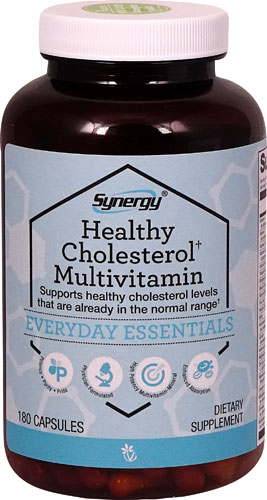[vc_row][vc_column][vc_column_text]What goes on in your gut may directly affect your cholesterol levels. As gut microbes break down the food you eat, they produce compounds that can influence how much cholesterol you produce, absorb and eliminate. These complex interactions may work together to help you maintain healthy cholesterol levels—if you have the right kinds of bacteria in your gut.

Does gut health affect cholesterol?
A gut microbiome with an abundance of microbes and microbial species—known as richness and diversity—is
associated with healthy cholesterol. Specific types of bacteria appear more beneficial than others, but some may disrupt healthy cholesterol metabolism and increase your risk of cardiovascular disease.
Gut bacteria may break down cholesterol
Some types of bacteria may reduce the amount of cholesterol you absorb by
helping your body make enzymes that break it down in the gut. These bacteria, which include
Eubacterium and
Oscillibacter, appear to affect genes called
IsmA genes, which produce enzymes that reduce cholesterol to other compounds like coprostanol. Having more coprostanol in your stool is associated with
lower blood cholesterol.
People with more
IsmA-influencing bacteria like
Eubacterium in their guts
appear to have better cholesterol profiles than those who don't. Other bacteria, including
Lactobacillus and
Bacteroides sp. strain D8, have shown similar effects in some lab studies.
Fiber-eating bacteria may support cholesterol genes and hormones
When gut bacteria like
Bacteroides, Bifidobacterium, and
Firmicutes break down high-fiber foods, they produce compounds called short-chain fatty acids (SCFAs). Higher SCFA levels are generally considered a good thing,
including when it comes to cholesterol.
SCFAs may activate receptors that trigger the secretion of glucagon-like peptides (GLP). These hormones
regulate cholesterol levels inside cells, which can prevent white blood cells from becoming
foam cells and reduce the risk of plaque formation.
Specific SCFAs appear to play different roles in cholesterol regulation. Propionate, for example, may
inhibit an enzyme involved in producing cholesterol, while butyrate may prevent your body from absorbing cholesterol. Butyrate may also
increase the production of proteins involved in reverse cholesterol transport: a process that
moves cholesterol out of cells and into the liver and gut to be excreted.
Some microbes produce compounds that may raise cholesterol
Pathogenic bacteria, including
E. coli and
Klebsiella, break down choline- and carnitine-rich foods like meat and eggs and produce a compound called trimethylamine (TMA). TMA travels to the liver, where it gets converted to trimethylamine-N-oxide (TMAO).
Unlike SCFAs, TMAO is associated with higher cholesterol and heart disease risk due to its role in:
TMAO's adverse effects may be counteracted by increasing SCFA producers like
Bacteroides, which are associated with lower TMAO levels.
Probiotics and cholesterol
Since microbes that produce SCFAs and metabolize cholesterol appear to help maintain healthy cholesterol balance, probiotics containing these microbes may offer support.
†
Studies on bacteria in the
Bifidobacterium, Lactobacillus and Enterococcus genera show that these microbes may support healthy levels of LDL, triglycerides and total cholesterol, particularly in
people with high cholesterol. For those with normal cholesterol, probiotics may support healthy HDL levels and regulate overall cholesterol profiles.
†
Prebiotics, the
fibers that probiotic microbes feed on, may also support cholesterol balance. Some studies show that prebiotic supplements can have similar effects to probiotics; when taken together, probiotics and prebiotics may
promote healthy HDL and support cholesterol ratios.
†
But not all studies show benefits from probiotics for cholesterol. Results depend on factors like
strain type, dosage and baseline cholesterol levels. More well-designed human studies are needed to pinpoint the most effective strains and doses.
Improve your gut health to lower your cholesterol
Although the science on gut health and cholesterol isn't conclusive, it does suggest some steps you can take to
support the richness and diversity associated with better cholesterol balance:
- Reduce meat and egg intake. Meat and eggs promote TMAO production, and meat-heavy diets have been associated with inflammation that can lead to oxidative stress, blood vessel damage and plaque formation.
- Eat more whole and minimally processed plant foods. Beans, whole grains, vegetables, fruits and mushrooms contain prebiotic fibers that feed SCFA-producing gut bacteria.
- Exercise regularly. A combination of moderate-intensity activity and short high-intensity workouts may increase SCFA production and promote microbiome diversity.
Making these changes can help beneficial bacteria thrive, boost your SCFA levels and keep TMAO in check. If you continue to struggle with high cholesterol after making diet and lifestyle changes, discuss additional cholesterol-lowering options with a knowledgeable healthcare provider.
†These statements have not been approved by the Food and Drug Administration. These products are not intended to diagnose, treat, cure or prevent disease.[/vc_column_text][/vc_column][/vc_row][vc_row][vc_column][vc_text_separator title="Featured Products" border_width="2"][vc_row_inner equal_height="yes" content_placement="middle" gap="35"][vc_column_inner width="1/3"][vc_single_image image="178186" img_size="full" alignment="center" onclick="custom_link" img_link_target="_blank" css=".vc_custom_1726868425065{padding-right: 7% !important;padding-left: 7% !important;}" link="https://www.vitacost.com/konsyl-gut-health-prebiotic-probiotic-fiber-gummies"][/vc_column_inner][vc_column_inner width="1/3"][vc_single_image image="178187" img_size="full" alignment="center" onclick="custom_link" img_link_target="_blank" css=".vc_custom_1726868440067{padding-right: 7% !important;padding-left: 7% !important;}" link="https://www.vitacost.com/kyolic-aged-garlic-extract-cholesterol-health-formula-104"][/vc_column_inner][vc_column_inner width="1/3"][vc_single_image image="158099" img_size="full" alignment="center" onclick="custom_link" img_link_target="_blank" css=".vc_custom_1726868485393{padding-right: 7% !important;padding-left: 7% !important;}" link="https://www.vitacost.com/bio-nutrition-cholesterol-wellness-60-vegetarian-capsules"][/vc_column_inner][/vc_row_inner][/vc_column][/vc_row]




